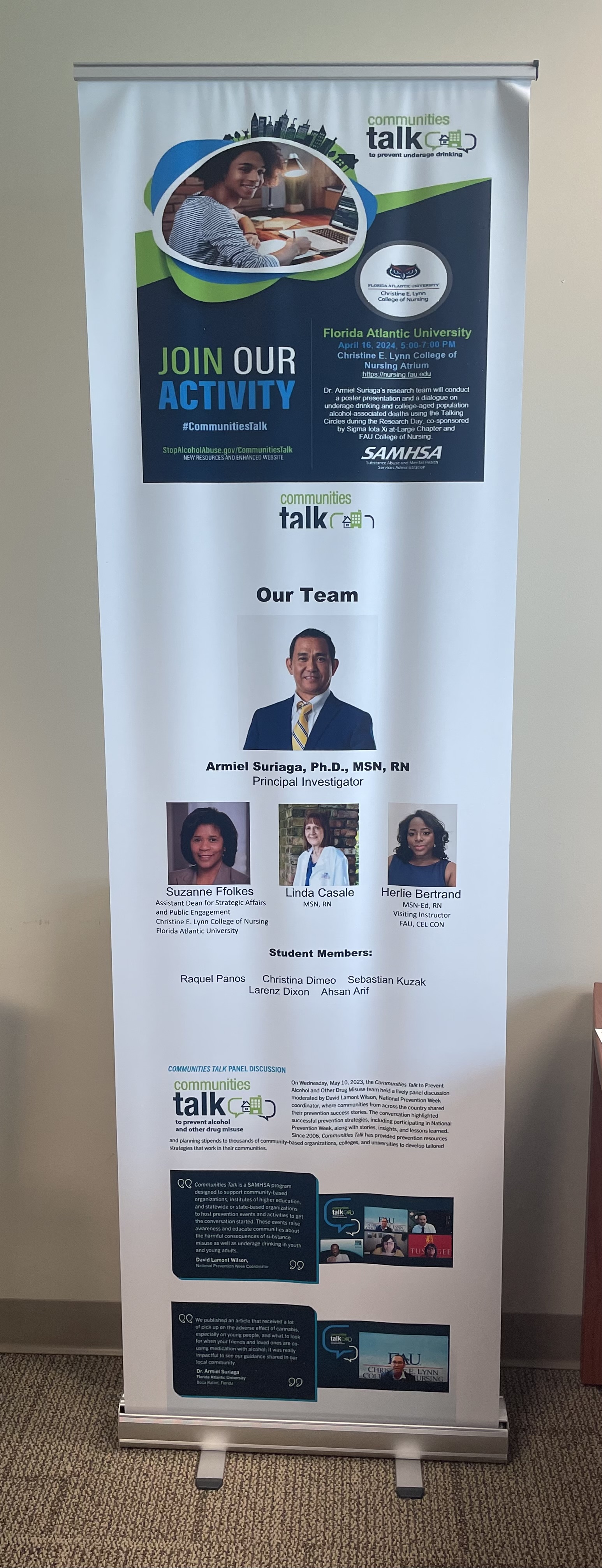|
Back to Prevention Stories
1) Poster presentation at the Sigma research Day focusing on alcohol-related mortality among underage and college-age population. 2) Dialogue- townhall presentation of alcohol-related mortality in underage and college-aged population with undergraduate students.
Hosted by:
Florida Atlantic University

Please briefly describe your Communities Talk activity.
For our Communities Talk activities, we conducted an in-person poster presentation on the crucial topic of the effects of underage drinking and college-age drinking, particularly when it results in crashes, suicides, and death. This activity was followed by a town hall meeting presentation with undergraduate students at Florida Atlantic University, spearheaded by our student members. We ordered a banner to promote our Communities Talk activity, which was a hit among faculty and students. We initially invited the mayor of Boca Raton, Florida, to provide us with the opening remarks and open dialogue but, unfortunately, he could not make it due to pressing commitments. Nevertheless, our town hall presentation successfully engaged students in discussing their concerns and suggestions for promoting a safe environment within and around campuses, mainly through responsible drinking after school or drinking cessation through active sports participation or involvement in student organizations.

How does alcohol and other drug misuse affect your community?

Substance misuse, particularly alcohol, affected our communities in the context of lives lost. We shared the results of our analysis, which we plan to publish. For example, in Florida, from 2020 to 2021, a total of 247 underage people (12-20 years old) died from alcohol use, while 741 college students (18-24 years old) died from alcohol use, which underscores the need for further interventions and extensive education dissemination on campus and in the community.

Which prevention strategy(ies), as defined by SAMHSA’s Center for Substance Abuse Prevention, best fit your Communities Talk activity?
- Information Dissemination Strategy - focuses on improving awareness and knowledge of the effects of AOD issues on communities and families through “one-way” communication with the audience such as speaking engagements, health fairs, and distribution of print materials.
- Education Strategy - focuses on “two-way” communication between the facilitator and participants and aims to improve life/social skills such as decision making, refusal skills, and critical analysis.
- Alternative Strategy - focuses on redirecting individuals from potentially problematic situations and AOD use by providing constructive and healthy events/activities.

What goal(s) did you hope to accomplish with your Communities Talk activity?
- Hold meetings or discussion groups on alcohol and/or other drug misuse prevention.
- Start a youth-led coalition on alcohol and/or other drug misuse prevention.
- Develop strategic plans to reduce and prevent alcohol and/or other drug misuse.

Did you accomplish your goal(s)?
Yes

What challenge(s) did you face in planning your activity this year?
- Needed additional resources to conduct activity
- We need funding to conduct a randomized control trial of the efficacy of our education interventions in increasing knowledge among participants and the community residents, and to collaborate with local rehabilitation centers.

How did you overcome these challenges?
We strategized to involve the local government by inviting the mayor to participate in this initiative. We need more funding to increase our visibility and incentivize students to recruit more students to join our cause/group. By having consistent activities throughout the year on substance misuse prevention, such as with ethanol and cannabis, we can robustly drive the message home to our students and the underage group.

What are your next steps?

- Create new action groups to tackle specific issues raised during our Communities Talk activity
- Expand our coalition with new partnerships in the community
- Conduct research efforts to learn more about issues in our community
- Create a public education campaign to raise awareness and/or change behaviors around underage drinking (i.e., create PSAs and other promotional materials)

If you’ve conducted Communities Talk activities in prior years, how has your repeated participation contributed to progress in achieving your prevention goals?
Our repeated participation established our presence and intentions in the community to reduce the harmful effects of binge drinking, including unnecessary early deaths of our future leaders or citizens.

Organizations that conduct Communities Talk activities often involve other organizations in the planning and execution of events. Please indicate which type(s) of organizations you involved in your activity planning.
- Faith-based based organizations
- Colleges or universities
- State and local government agencies (e.g., public health departments)

Which of the following best describes the primary audience(s) for your Communities Talk activity?
- Teachers or other education staff
- Doctors, nurses, or other health care professionals
- Healthcare providers
- Hispanic community members

How did you reach and engage your primary audience(s) to encourage them to participate in your activity?
We are creating and displaying the banner in the atrium, promoting it in our newsletter, making announcements in Canvas courses, and promoting by word of mouth.

Which Communities Talk resources (or other SAMHSA resources) were most helpful for your activity?

- Communities Talk toolkits
- Communities Talk support staff
- N/A
|
|